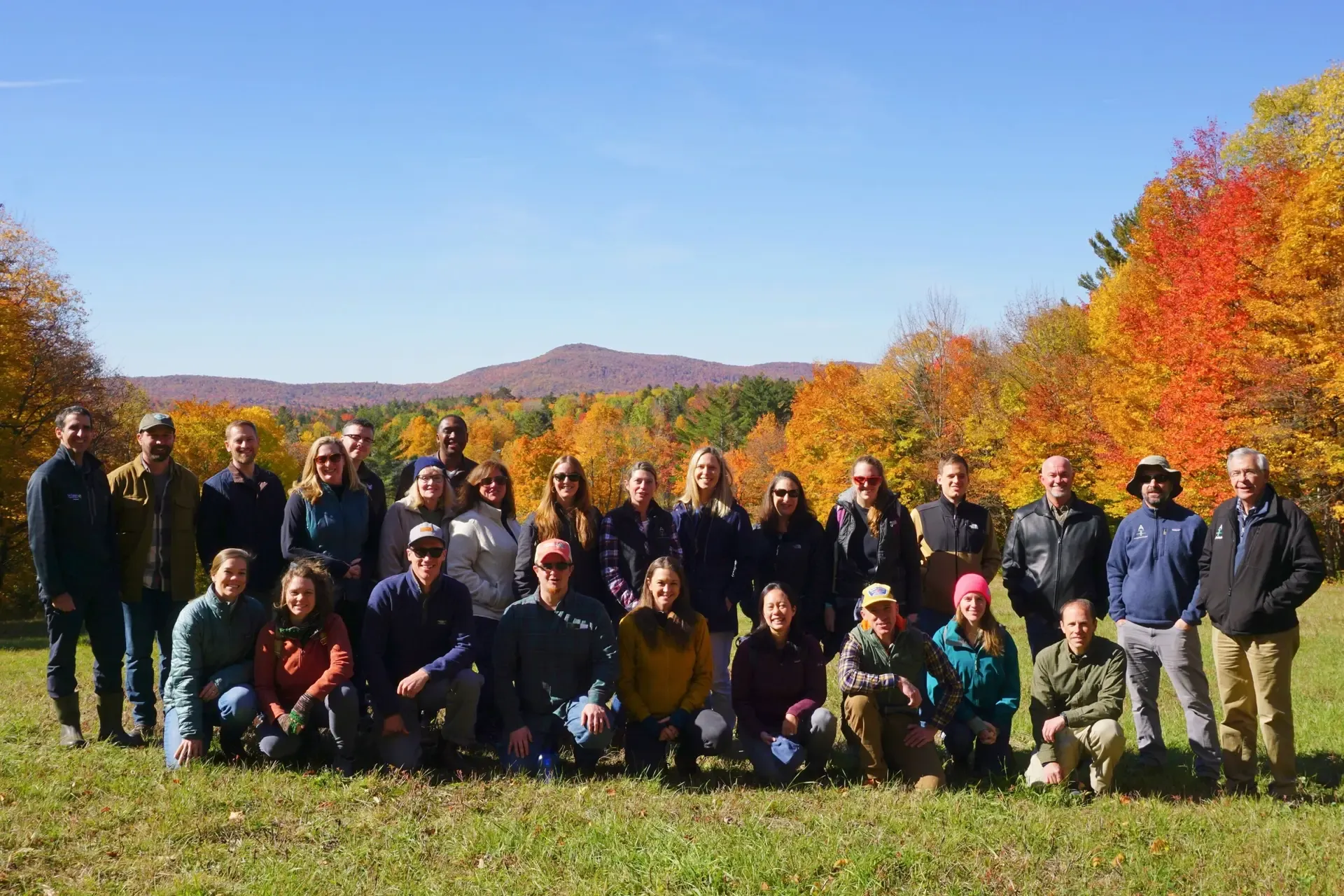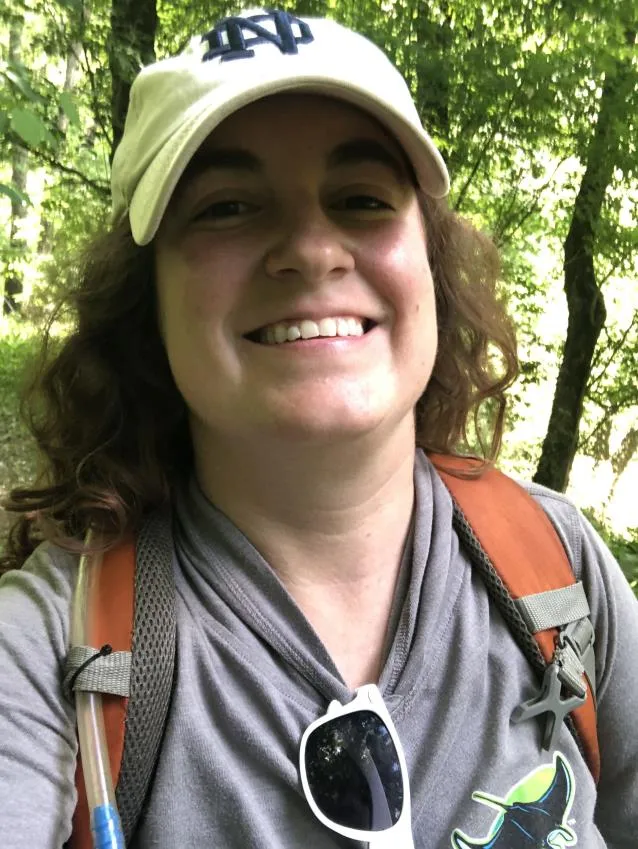First-Ever Family Forest Carbon Program Partner Retreat Tackles Carbon Market Opportunity for Family Forests

While carbon markets are always evolving, there’s one constant: the need for collective action. The work of the Family Forest Carbon Program is possible thanks to the efforts and support of our buyers, donors and scientific partners. That’s why the American Forest Foundation was excited to host the first-ever Family Forest Carbon Program Partner Retreat last week, bringing together climate leaders across sectors and industries.
Revenue from carbon markets can provide the income landowners need to keep their land and help it flourish with climate-smart forestry practices.
Partners gathered in Shrewsbury, Vermont to see the impact of the Family Forest Carbon Program firsthand, meet one of the program’s enrolled forest owners and discuss opportunities for scaling the program to unlock the potential of thousands more forest owners in the years to come.
AFF President and CEO Rita Hite kicked off the event by sharing the excitement of being together in person and introducing Tim Stout, one of the initial enrollees in the Family Forest Carbon Program. “We’d like to thank our partners and incredible landowners like Tim for this opportunity to be together,” she said. “The carbon markets are new and we’re all leaders in this ever-changing landscape. We’re learning together, we’ll make mistakes together and we’ll find solutions together.”
During the retreat, attendees participated in a forestry tour of Tim Stout’s 175-acre property, the Jockey Hill Farm, and heard from program leaders on carbon science and biodiversity. While walking Stout’s land, attendees heard why the funding and resources the Family Forest Carbon Program offer are so vital to family forest owners and the climate.
Stout shared the challenges of keeping forests intact and retaining land tenure. As maintenance expenses accumulate and the cost of forest products such as timber fluctuates in the markets, landowners will sometimes cut down additional trees or even sell parts of their land to make ends meet. Revenue from carbon markets can provide the income landowners need to keep their land and help it flourish with climate-smart forestry practices.
To support family landowners and the almost 300 million acres of forest they own, there remains a large need for landowner education about the opportunity in the markets. “Carbon markets are intimidating. But it’s straightforward once you’ve had conversations about it,” said Stout.
Discussions during the retreat revealed a major opportunity for the Family Forest Carbon Program: scaling and improving communications to landowners. In a fireside chat with Rita Hite, REI’s Senior Manager of Government and Community Affairs Taldi Harris emphasized the dire need for better science communication. “We want to help scale nature-based climate solutions,” said Harris. “To do that, we need the right messengers to reach these landowners.”
Clear communication from trusted sources is what convinced Stout to join the Family Forest Carbon Program. “It’s important to have an ally to rely on,” he said. “The American Forest Foundation was so personable, and that personal touch helped me understand the opportunity in the carbon markets.” The potential that carbon markets have for family forests must be shared clearly to landowners, foresters and other advocates.
Along with communication, scaling the science was also identified as a crucial challenge. The Family Forest Carbon Program is advancing the market toward higher scientific integrity with its innovative methodology that uses a dynamic baseline, but these innovations and the co-benefits produced are not yet fully captured in the market. “[Carbon credit] differentiation is not easy, and the full value of a credit coming out of FFCP is currently not being recognized in this market,” said Madeline Wu, mission investing officer at the David and Lucille Packard Foundation. For carbon markets to scale and succeed, there needs to be greater recognition from buyers and other institutions of higher integrity carbon accounting methodologies like the one used in the Family Forest Carbon Program.
The first Family Forest Carbon Program Partner Retreat allowed AFF to convene partners and climate leaders to collectively focus on these pressing challenges and opportunities. Once brought to scale, carbon markets have the opportunity to make a transformational impact for family forest owners, rural communities and the climate. “We’re trying to achieve a mission outcome here: address a climate crisis, address a forest crisis and help these landowners hold on to the lands they’ve come to love,” said Jim Shallow, director of strategic conservation initiatives at The Nature Conservancy’s Vermont chapter. “The Family Forest Carbon Program is uniquely positioned to do just that.”
For more information about the Family Forest Carbon Program and how to partner with us on fighting climate change, visit familyforestcarbon.org.
Related Articles

July 1, 2025
Forester Spotlight: Sarah Cawood
We’re excited to highlight Sarah Cawood, a dedicated forester with the Family Forest Carbon Program (FFCP) who brings enthusiasm, experience, and a strong commitment to conservation to her work.

June 3, 2025
Why Wildlife Loves Loblolly—And How These Pines Can Benefit Your Land
A quiet stretch of pine trees can offer more than just scenery—it can provide vital habitat for wildlife across every season. Loblolly pine, the most common native tree species in the Southeast, plays a particularly important role in creating habitat for a wide variety of game and non-game species, from wild turkeys and rabbits to songbirds and squirrels.

May 28, 2025
New Report Details Innovative Approach to Permanence for Natural Climate Solutions
The American Forest Foundation released today “A Trust for Permanence: Enabling a New Generation of Permanent Nature-Based Credits in the Voluntary Carbon Market,” a new concept paper that details an innovative approach to ensuring the quality and integrity of credits produced through natural climate solutions (NCS).